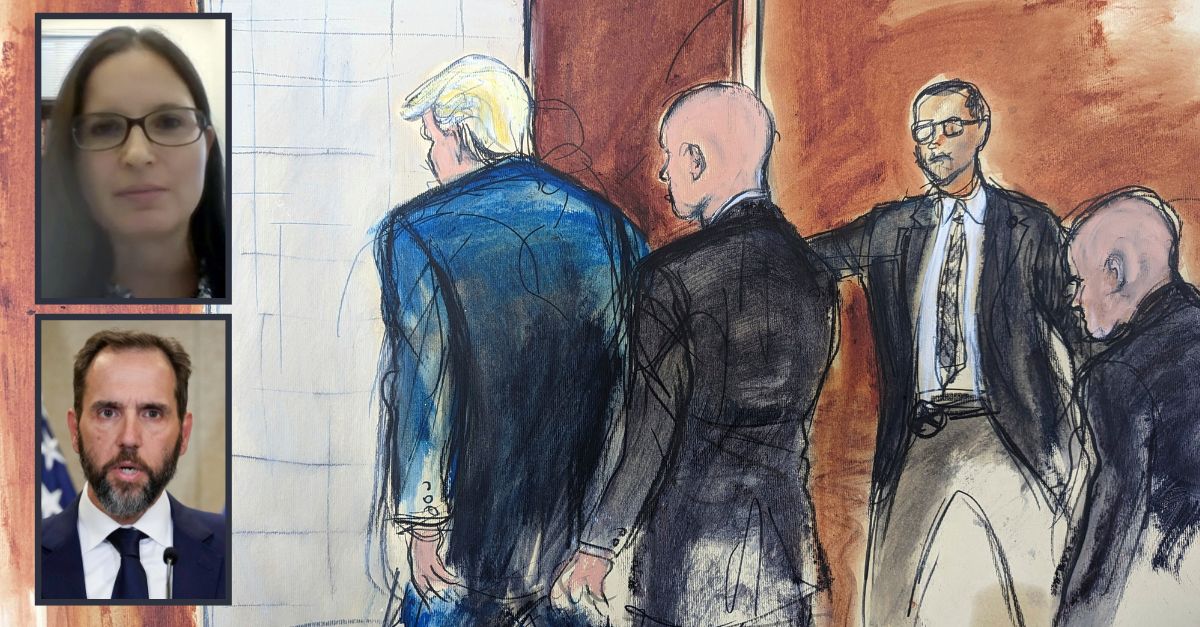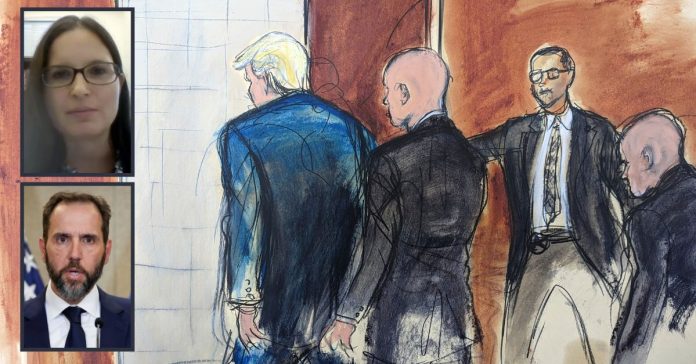
Background: In this courtroom sketch, former President Donald Trump, left, is escorted out of the courtroom by a U.S. Marshal with co-defendant Walt Nauta, right, walking behind him as another U.S., Marshal holds the door follow their proceeding in federal court, Tuesday, June 13, 2023, in Miami. (Elizabeth Williams via AP)/Top left: Aileen M. Cannon speaks remotely during a Senate Judiciary Committee oversight nomination hearing to be U.S. District Court for the Southern District of Florida on July 29, 2020, in Washington. (U.S. Senate via AP)/Bottom left: Special counsel Jack Smith. (AP Photo/J. Scott Applewhite, File)
Special counsel Jack Smith has called out U.S. District Judge Aileen Cannon, saying her recent order to unseal redacted discovery records in former President Donald Trump‘s impending classified documents trial would needlessly expose witnesses and potentially trigger intimidation and threats — including to her.
In a 22-page motion for reconsideration and stay, Smith laced into the judge as he attempts to fight off public exposure to a swath of unredacted documents before what is a tentatively set May 20 trial date.
Cannon recently denied requests from prosecutors to seal or redact some of the materials they have already given to Trump’s lawyers and that Trump’s lawyers in turn have attached to their own motions on the federal docket in Florida.
“That discovery material, if publicly docketed in unredacted form as the Court has ordered, would disclose the identities of numerous potential witnesses, along with the substance of the statements they made to the FBI or the grand jury, exposing them to significant and immediate risks of threats, intimidation, and harassment, as has already happened to witnesses, law enforcement agents, judicial officers, and Department of Justice employees whose identities have been disclosed in cases in which defendant Trump is involved,” Smith wrote.
In response, Cannon issued a paperless order on Friday that Trump’s lawyers now have until Feb. 23 to respond to Smith’s motion for reconsideration:
On or before February 23, 2024, Defendants shall file a response to the Special Counsel’s Motion for Reconsideration 294 . S.D. Fla. L.R. 7.1(c)(1). The deadlines established in the Court’s prior Orders 283 286 are temporarily stayed pending resolution of the Special Counsel’s Motion. To the extent this Order impacts Defendants’ forthcoming Reply in Support of Motions to Compel 262, Defendants shall advise the Court by filing a Notice no later than 3:00 p.m. on February 9, 2024. The parties are advised to adhere to the instructions in paragraph 4 of the Court’s Order [283 p. 9-10]. Signed by Judge Aileen M. Cannon on 2/9/2024. (jf01) (Entered: 02/09/2024)
The revised date is notable. In a scathing and separate motion also filed Thursday, prosecutors urged Cannon not to let Trump’s lawyers intentionally dawdle on filing pretrial motions as a way to interminably delay facing a jury. Prosecutors noted in that same brief that Trump has said he plans to file a motion to dismiss the Florida indictment altogether on the basis of “presidential immunity.” This scheme has so far been unsuccessful in other venues.
As for Smith’s motion to reconsider, as noted by Brookings Fellow Institute legal analyst Norm Eisen on Friday on X.com, the motion for reconsideration could have big implications: Cannon already has “two strikes” against her.
The first strike, Eisen posited, stems from the time the Eleventh Circuit preliminarily reversed a stay Cannon imposed barring the government from using over 100 documents with classified markings found at Mar-a-Lago for their investigation. The second time arrived when the circuit permanently reversed her appointment of a special master.
Smith acknowledged Thursday that his request is one rarely invoked and that reconsideration is an “extraordinary remedy.”
“As in civil cases, there are three major grounds which justify reconsideration: (1) an intervening change in controlling law; (2) the availability of new evidence; and (3) the need to correct clear error or prevent manifest injustice. [R]econsideration is an extraordinary remedy that should be employed sparingly,” Smith wrote.
Smith argued Cannon’s findings were off base and threatened to provoke “manifest injustice,” telling the Trump-appointed judge she was applying the wrong standards for discovery materials and that her reasoning when denying a request to protect witnesses or preserve the integrity of other materials simply failed to meet long-held standards of “compelling interest” and “narrow tailoring.”
First Amendment access rights matter but they are not controlling, he continued, noting that the Eleventh Circuit itself has refused to treat all documents equally, squaring rules for access against the need for confidentiality.
“The defendants here were not legally entitled to a list of the Government’s witnesses, or to their statements or grand jury transcripts, prior to trial. These rules reflect a key ‘purpose of the Jencks Act,’ which is ‘to protect government files from unwarranted disclosure,’” Smith wrote.
The Government has nevertheless produced those materials, and more, far in advance of trial, in minimally redacted form — but only because the materials were subject to a protective order that allows the defendants to prepare for trial while limiting the risks of unwarranted disclosure, in part, by stating, “Defendants shall not disclose Discovery Material in any public filing or in open court without notice to, and agreement from, the United States, or prior approval from the Court.”
That is precisely why no discovery was provided until the Court entered its protective order. And while the protective order permits the defendants to seek Court approval when the Government’s agreement has been withheld… that procedure presupposes that the burden is on the defendants to justify the basis for publicly disclosing presumptively confidential discovery material — including by justifying the basis for revealing the identities of witnesses and the substance of their expected testimony.
Specifically, prosecutors want to keep documents under wraps that list the names of FBI agents who searched Trump’s Mar-a-Lago estate as well as a floor plan of the property that is not public. Details of where Barron Trump’s bedroom is located should also be shielded, Smith argued. The same goes for various records containing witness interviews grand jury statements, FBI interviews, and the names of career civil and public servants as well as those staff who work at Mar-a-Lago.
There is a long-standing record to support concerns over threats to witnesses or other parties to the case, including Cannon, the special counsel highlighted.
FBI agents were “threatened and harassed” in August 2022 when a magistrate judge unsealed details of the search warrant for Mar-a-Lago. That same judge also received death threats.
“This court has suffered similar death threats,” Smith wrote.
Tiffani Gish, a Texas woman, was charged in September 2022 after she left threatening voicemails on Cannon’s court chamber telephone, Law&Crime previously reported, including telling the judge: “I’m also Trump’s hitman, so consider it a bullet to your head from Donald Trump himself…”
Another record prosecutors say they are concerned about exposing includes information of “uncharged potentially obstructive conduct by a defendant, and speculation about witness tampering by an uncharged individual.”
“Indeed, the witness whose statement appears in Exhibit D declined to have his interview recorded, citing the associated risks to him in ‘Trump world’ of doing so. Exhibit D also contains the witness’s opinions about other potential witnesses and information about the case that other witnesses have revealed…” Smith wrote.
Lawyers for Trump did not immediately return a request for comment to Law&Crime.
Have a tip we should know? [email protected]

